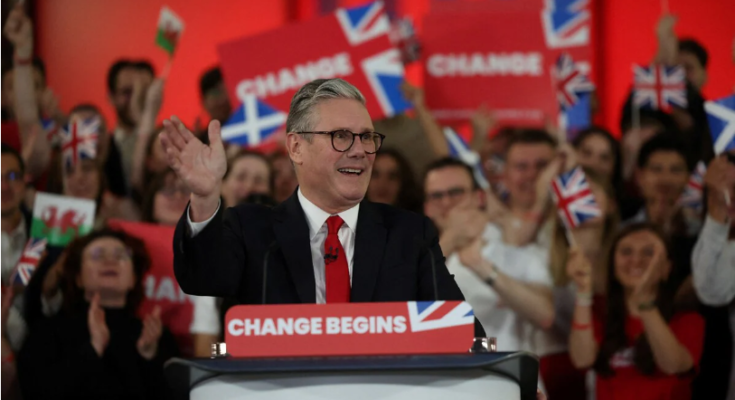The political landscape in the United Kingdom has been dramatically reshaped with Keir Starmer stepping into the role of Prime Minister. From his early days as a young barrister to his tenure as the leader of the Labour Party, Starmer’s rise to power is nothing short of remarkable. In this blog post, we’ll explore his political journey, the current challenges facing the UK, and what his leadership means for the nation’s future. By the end, you’ll have a comprehensive understanding of this pivotal moment in UK politics.
Keir Starmer’s Political Journey
Keir Starmer was born in London and named after the first Labour Party leader, Keir Hardie. His career started in law, where he became known for his work as a barrister specializing in human rights. Starmer’s dedication and legal acumen led to his appointment as Director of Public Prosecutions in 2008.
Starmer’s transition into politics came in 2015 when he was elected as the Member of Parliament for Holborn and St Pancras. Known for his meticulous approach and strong oratory skills, he quickly became a prominent figure within the Labour Party. His leadership was recognized in 2020 when he was elected as the leader of the Labour Party, succeeding Jeremy Corbyn.
Throughout his political career, Starmer has consistently focused on issues of social justice, equality, and fairness. His background in law has shaped his approach to governance, emphasizing the importance of evidence-based policy and accountability.
The Current Political Climate in the UK
The UK is navigating through turbulent times. The aftermath of Brexit, economic instability, and a global pandemic have left the nation grappling with numerous challenges. Public trust in the government has waned, and there is a pressing need for effective and transparent leadership.
Brexit has redefined the UK’s relationship with the European Union, affecting trade, immigration, and regulatory standards. The economic impact of the COVID-19 pandemic has further strained public resources, increasing unemployment rates and stretching the healthcare system to its limits.
Climate change remains a critical issue, with growing calls for sustainable policies and actions. The political climate is also marked by increasing polarization, making it difficult to achieve consensus on key issues.
Starmer’s Key Policy Proposals
Starmer’s policy platform is built on principles of justice, equality, and sustainability. One of his main focuses is revitalizing the economy through investment in green energy and infrastructure. By promoting renewable energy sources and creating jobs in the green sector, Starmer aims to tackle climate change while boosting economic growth.
Healthcare is another priority. Starmer has pledged to increase funding for the National Health Service (NHS), ensuring that it can provide high-quality care to all citizens. This includes addressing the backlog of treatments and expanding mental health services.
On education, Starmer plans to reduce class sizes, invest in teacher training, and ensure that every child has access to a quality education. He has also proposed policies to make higher education more affordable and accessible.
Public and Political Reactions to Starmer’s Leadership
Public opinion on Starmer’s leadership is mixed but generally positive. Polling data indicates a steady increase in his approval ratings since taking office, with many UK residents appreciating his calm, measured approach compared to his predecessors.
Political analysts have noted a clear shift in tone and strategy under Starmer’s leadership. His emphasis on unity and pragmatism contrasts sharply with the divisive tactics seen in recent years. Many within the Labour Party view Starmer as a unifying figure capable of bridging the gap between different factions.
However, there are also critics who question his ability to connect with voters on a personal level. Some argue that his technocratic style may lack the emotional appeal needed to inspire widespread support.
The International Impact of Starmer’s Leadership
Starmer’s ascent to Prime Minister is poised to have significant implications on the global stage. His commitment to rebuilding alliances with European partners is seen as a positive step towards repairing relationships strained by Brexit. Starmer has expressed a desire to collaborate closely with EU nations on issues such as trade, security, and climate change.
In terms of foreign policy, Starmer has signaled a shift towards a more multilateral approach, emphasizing the importance of international cooperation and diplomacy. This includes reaffirming the UK’s commitment to global institutions like the United Nations and NATO.
Starmer’s stance on human rights is also expected to shape his international agenda. He has been vocal about the need to address global injustices and support humanitarian efforts worldwide.
Conclusion
Keir Starmer’s leadership represents a new chapter for the UK. His focus on justice, equality, and sustainability offers a vision of hope and progress in these challenging times. While the road ahead is undoubtedly fraught with obstacles, Starmer’s pragmatic approach and commitment to evidence-based policy provide a solid foundation for navigating the complexities of modern governance.
For political enthusiasts, UK residents, and current affairs readers, the unfolding story of Keir Starmer’s premiership is one to watch closely. The potential for bipartisan cooperation, the impact on international relations, and the drive for a more just and equitable society are themes that will define the UK’s future under his leadership.
What are your thoughts on Keir Starmer’s approach and policies? Join the conversation and share your opinions in the comments below. Engage with our community as we discuss the implications of this significant political shift.



